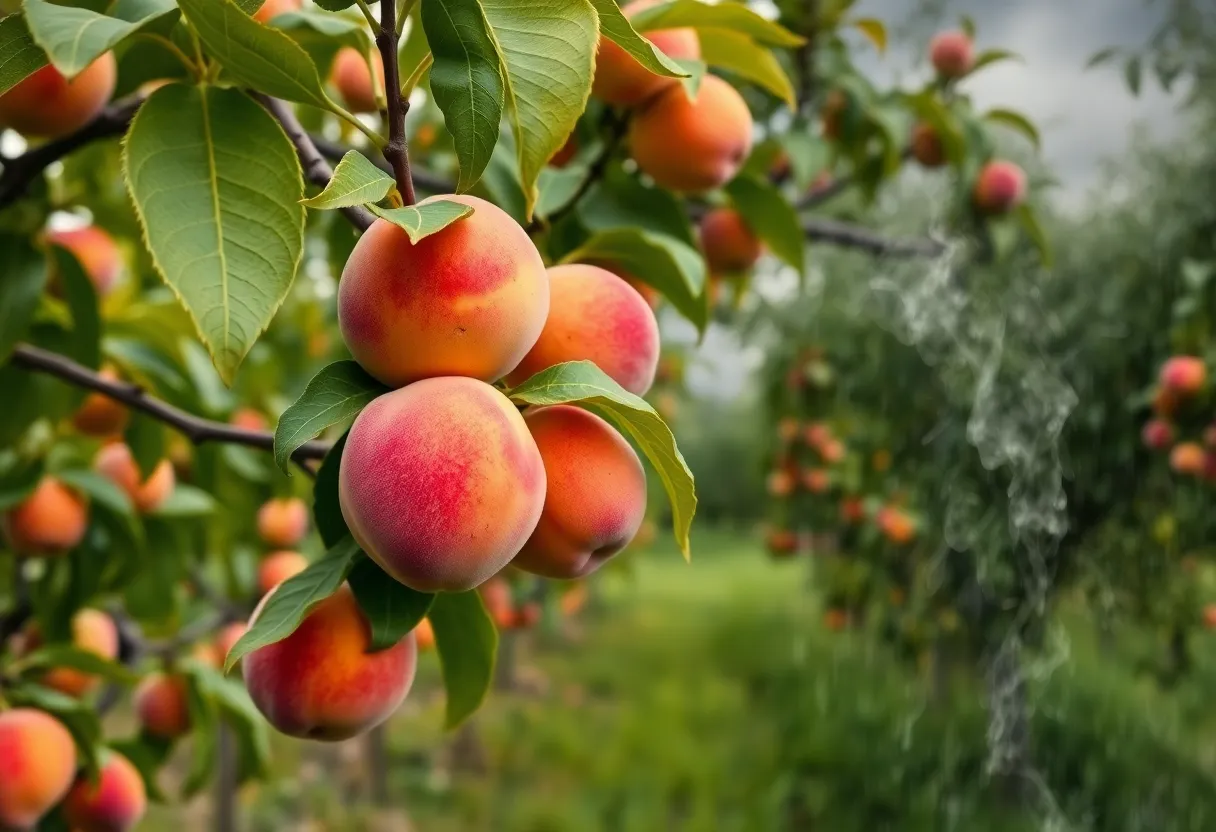News Summary
Farmers in California’s Central Valley are experiencing a 30% drop in this year’s peach harvest due to warmer winters disrupting the dormancy cycles of peach trees. The Masumoto Family Farm is among those impacted, facing challenges amid rising costs as crop failures jeopardize incomes. This dilemma highlights the broader implications of climate change on agriculture and emphasizes the need for sustainable practices as farmers adapt to unpredictable weather patterns.
California – Farmers in California’s Central Valley are grappling with a significant 30% decrease in this year’s peach harvest, largely attributed to warmer winters that have disrupted the natural sleep cycles of peach trees. The Masumoto Family Farm, renowned for its delectable peaches sought after by prestigious restaurants, is one of the many orchards feeling the impact of climate change on their livelihood.
Peach trees rely on a requisite number of hours below 45 degrees Fahrenheit during winter to enter a critical dormant phase that helps regulate their nutrient supply. The pervasive warmer winter experienced this year interfered with this dormancy, leading to inconsistent cold weather conditions. As a result, some farmers have reported complete crop failures, jeopardizing the income they derive from the 12-week peach harvesting period each year.
Raymond Mireles, an agriculture adviser with the University of California, highlighted the profound effects of disrupted sleep cycles. He explained that the inability of peach trees to maintain carbohydrates in their roots due to irregular sleep patterns has played a significant role in the current harvest’s decline. Farmers are now facing a dilemma as prices rise, with consumers paying an average of 23 cents more per pound for yellow peaches and 17 cents more for white peaches.
The Masumoto Family Farm has had some respite from the losses thanks to one of its oldest peach groves, which has partially contributed to their ability to pack and ship approximately 10,000 pieces of fruit daily. Aging peach trees and traditional irrigation methods have been beneficial in coping with temperature variations. However, many farmers continue to face challenges as crop farming remains a high-stakes endeavor characterized by unpredictability, often described as “gambling in a casino.”
Climate change poses a serious threat to peach production, exacerbated by an increase in late spring freezes and warmer winter conditions. For example, South Carolina has suffered devastating losses this season, with a late freeze destroying around 70% of its peach harvest. Expert reports indicate that Georgia may have experienced even more damaging effects than South Carolina. In this context, the need for specific chilling hours during dormancy is crucial; deviations from these requirements can severely threaten peach yields.
The unpredictability of weather patterns has made peach farming labor-intensive and sensitive to variables beyond farmers’ control. Many growers have implemented various protective measures, such as burning straw bales and operating wind machines, to shield trees during cold snaps. At McLeod Farms, owned by the McCormick family for five generations, investments in frost protection technology have enabled them to retain most of their crop during the latest freeze, demonstrating how proactive measures can mitigate losses.
Despite the risks accompanying peach farming, the economic returns are substantial. Peach cultivation generates over $98 million annually for South Carolina’s peach industry, making it a lucrative endeavor for farmers who, in spite of unpredictable conditions, continue to plant more peach trees and invest in protective technologies for their orchards.
The ongoing challenges faced by peach farmers are beginning to highlight the vulnerabilities present in the agricultural supply chain due to climate change. While crop insurance may mitigate losses for some, many farmers struggle to secure coverage until after experiencing severe weather events. The momentum in addressing these vulnerabilities may prompt a shift in how farmers approach peach production amid an ever-changing climate, as they seek sustainable solutions to safeguard their future harvests.
Deeper Dive: News & Info About This Topic
- CBS News: California Peach Harvests and Climate Change
- Wikipedia: Peach
- The Guardian: Peach Harvest in the Southern United States
- Google Search: Peach Farming Climate Change
- The New York Times: Peaches and Climate Change
- Encyclopedia Britannica: Climate Change
- ScienceDirect: Climate Change Impact on Agriculture
- Google News: Peach Harvest News
- The Atlantic: Climate Change and Fruit Production
- Google Scholar: Peach Trees Dormancy

Author: STAFF HERE COSTA MESA WRITER
The COSTA MESA STAFF WRITER represents the experienced team at HERECostaMesa.com, your go-to source for actionable local news and information in Costa Mesa, Orange County, and beyond. Specializing in "news you can use," we cover essential topics like product reviews for personal and business needs, local business directories, politics, real estate trends, neighborhood insights, and state news affecting the area—with deep expertise drawn from years of dedicated reporting and strong community input, including local press releases and business updates. We deliver top reporting on high-value events such as the OC Fair, Concerts in the Park, and Fish Fry. Our coverage extends to key organizations like the Costa Mesa Chamber of Commerce and Boys & Girls Clubs of Central Orange Coast, plus leading businesses in retail, fashion, and technology that power the local economy such as Vans, Experian, and South Coast Plaza. As part of the broader HERE network, including HEREAnaheim.com, HEREBeverlyHills.com, HERECoronado.com, HEREHollywood.com, HEREHuntingtonBeach.com, HERELongBeach.com, HERELosAngeles.com, HEREMissionViejo.com, HERESanDiego.com, and HERESantaAna.com, we provide comprehensive, credible insights into California's dynamic landscape.


